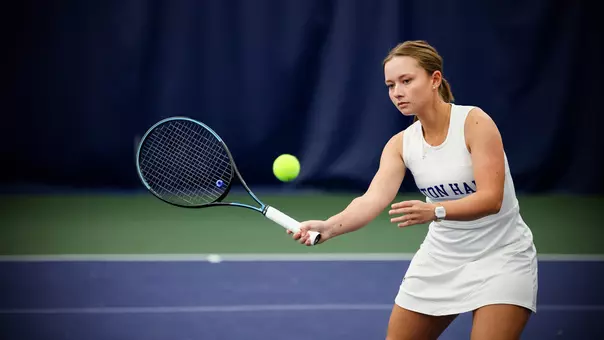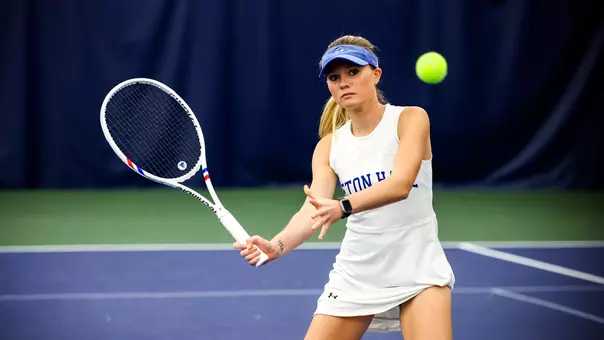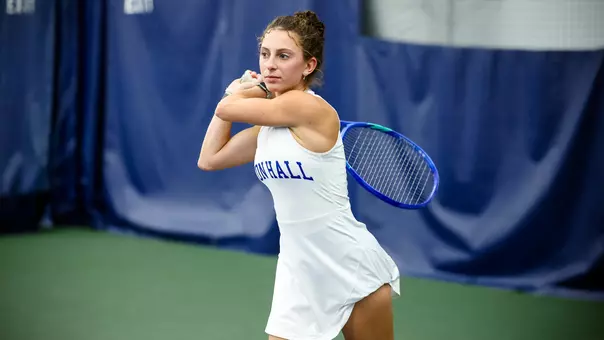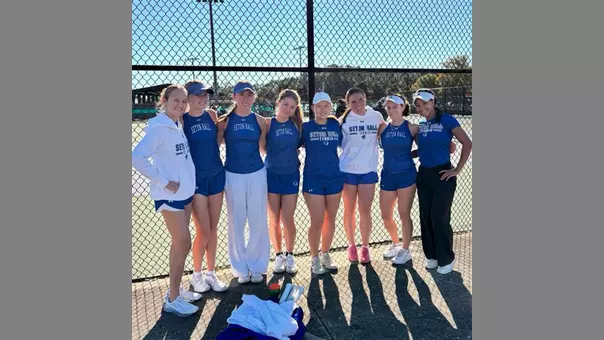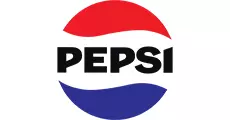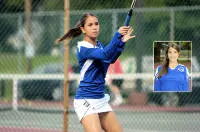
"At the Net" with Karina Cordero
12/1/2011 12:00:00 AM | Women's Tennis
SOUTH ORANGE, N.J. - Junior Karina Cordero (Maracay Estado Aragua, Venezuela) started her third season with the Seton Hall tennis team off with a bang. Cordero took home the C flight singles title at the Quinnipiac Invitational and teamed with her partner, Courtney Kilarski (Roseville, Calif.) to capture the first doubles title the program has won at the Quinnipiac tournament. Cordero and Kilarski also teamed to win the consolation bracket in the A flight of the highly competitive Eastern Championships. The upperclassman concluded her fall season by earning one of the Pirates' three points in their match at Fairleigh Dickinson to remain undefeated in singles matches on the year.
Cordero recently took a break from winter training to sit down for the second installment of "At the Net."
Q: What were some of the factors that went into the success you experienced during the fall?
Cordero: As a team, we are more together. That helps us because when we support each other and there is more trust between us, it produces a better atmosphere for us to play in and helps drive us during a match. I think this is important because in tennis there is a lot of emphasis on individual performance. You need to be at your peak during each point. The entire team has a positive attitude and with that, a renewed focus on preparation and dedication to winning that has led to improved results.
Q: Is there a difference between your approach to a singles match and your thought process during a doubles match?
Cordero: In singles, there is a little more pressure but at the same time you have the freedom to make your own choices. In doubles, you have to remember you are playing as part of a team. You need to have good communication and understanding among partners. Any decision that you make is going to impact your partner and you need to do your best not to put them in a bad position. Before points are played, we try to schedule our shots and come up with a collective strategy. Doubles presents its own challenge in that it's a shorter match and each point means a little more. The main difference is that you need to play with a plan that is not simply your own.
Q: As an upperclassman, what are some of the things you do to help the younger team members adapt to college?
Cordero: We do our best to make our newcomers feel as welcome as possible. Most of us came from another country so besides adjusting to college, it is a big change in culture. We have been through the same experiences of being in a new place so we try to build a team environment that gives them a level of comfort. This is important because it is impossible to play well with all those other things on your mind. By making them feel welcome, they can play loose, have fun and contribute to the best of their ability.
Q: Looking back, what was the hardest part of your transition to living in the United States?
Cordero: For me, the hardest part was the language. When I came as a freshman, I had just turned 17 and I did not speak English very well. It was very hard for me in class and the only thing I could do was work extra hard to pick it up. Also, on the tennis court, it was a challenge because you need to speak English in order to communicate effectively with your partner. Sometimes in the heat of the moment it was easy to forget and I would yell something in Spanish. It is easier now because I have been here for a longer period of time.
Q: What are your hopes for you and your team heading into the spring season?
Cordero: I am hoping we can improve on our results from prior years. In the past, we have played a number of really close matches but we were missing that winning edge. Hopefully we can build off the success we had in the fall and with strong doubles teams we can finally get over that hump and win those matches. The goal is to qualify for the BIG EAST Championships. Ultimately, I want to play well and represent Seton Hall well I love being a Pirate and I am thankful for the opportunity that SHU has given me.











